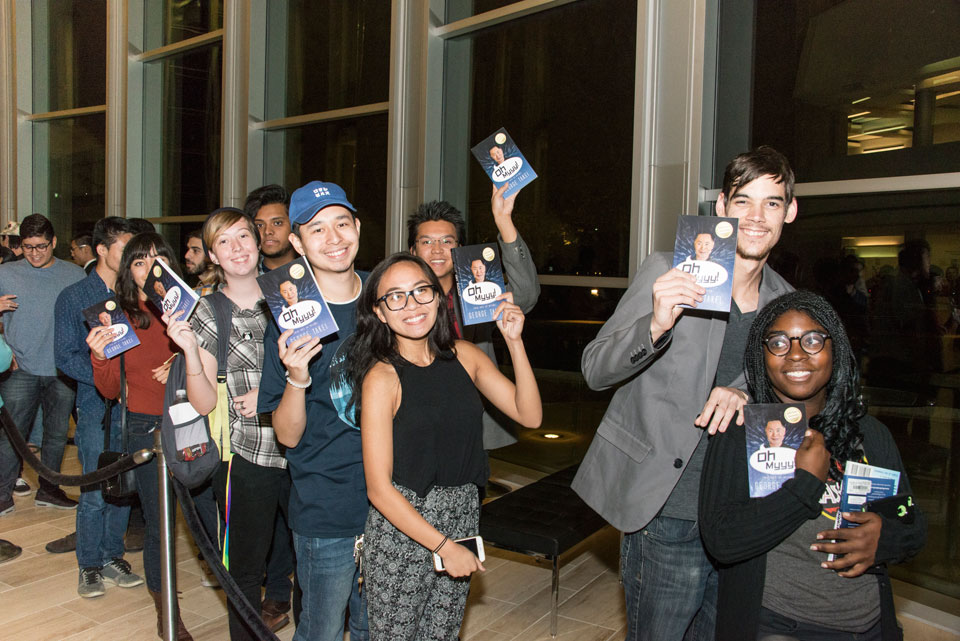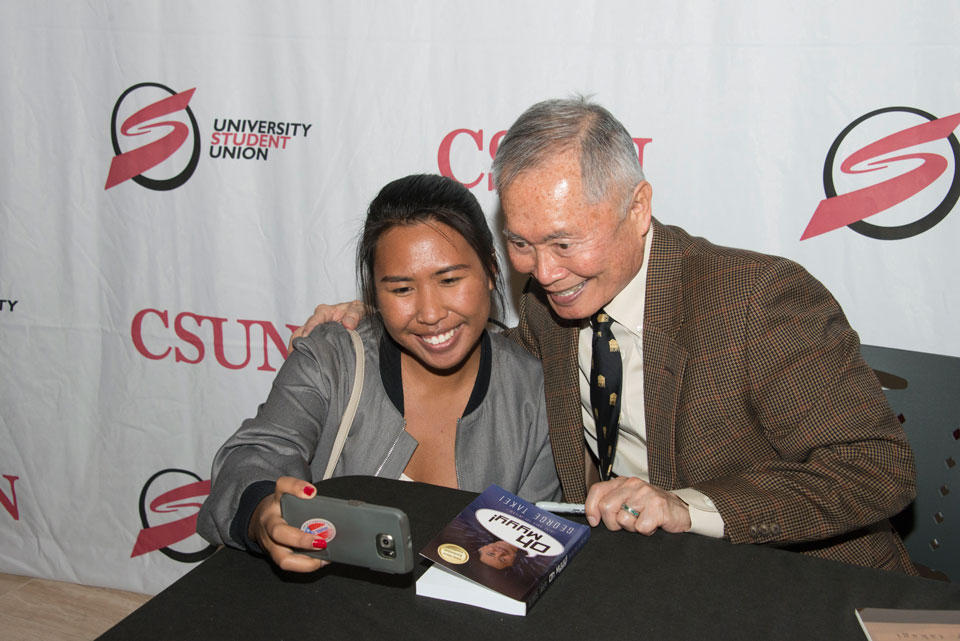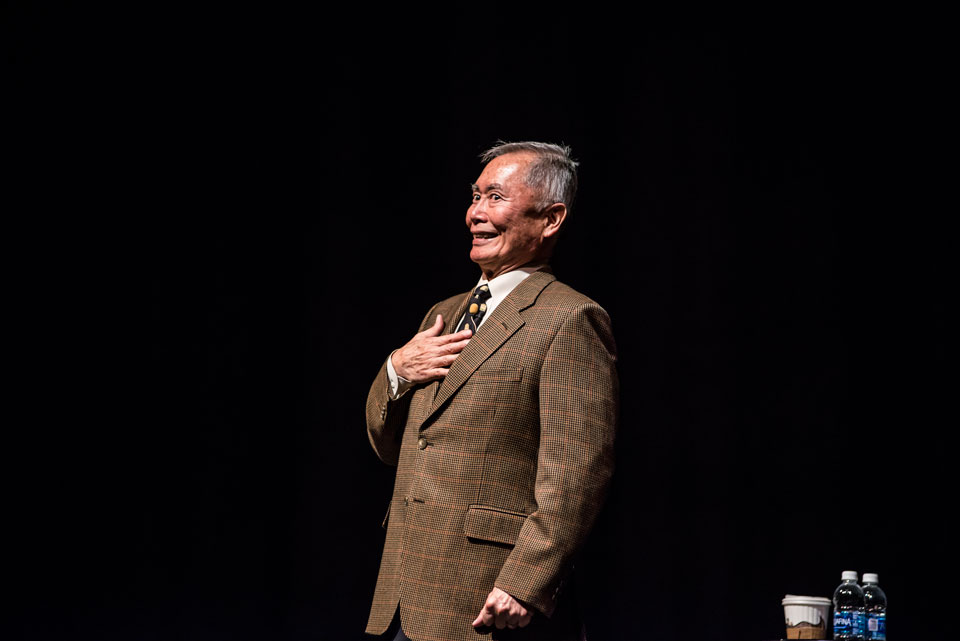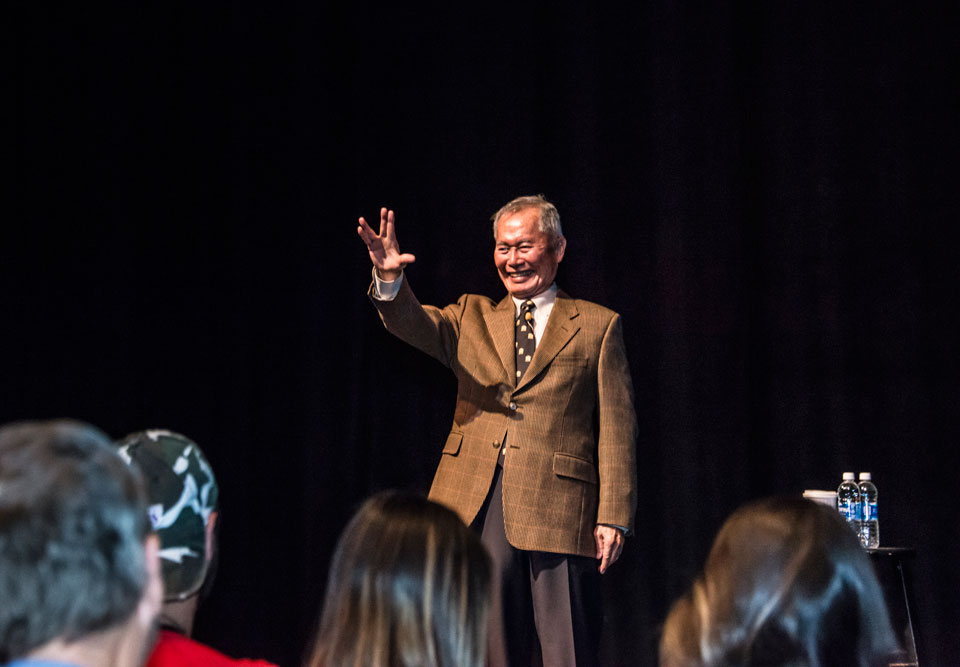Engage! George Takei Discusses Discrimination and Activism at Special VPAC Lecture
Much has changed for actor, activist and social media icon George Takei in the 50 years since Star Trek first hit the air. Sharing stories from his career and activism, as well as insights into his early years, Takei painted a picture of his life for students, faculty, staff and community members at California State University, Northridge’s Valley Performing Arts Center in a special evening lecture Nov. 15.
Throughout his life, Takei has been an outspoken advocate for various political issues and human rights. However, as a young TV actor playing “Mr. Sulu” in the 1960s, Takei was not free to speak out about the issue closest to him – gay rights.
“Through all those years of activism, I was silent on the one issue that was very personal to me, that was organic to me,” Takei said.
Takei knew he was “different” at a young age, he said, but was unable to come out publicly as it would endanger his career.
“I was pursuing an acting career, a very visible public career, and I knew that I could not have that career if it was known that I felt the way I did,” Takei said. “[It’s] a double life, and it is very, very difficult living that double life. … You’re constantly aware of people that could expose you.”
His support for LGBTQ organizations was primarily monetary until 2005, when he and his partner, Brad Altman, decided to speak out against California Gov. Arnold Schwarzenegger’s veto of a same-sex marriage bill. Three years later, with same-sex marriage being legalized though the California court system, Takei and Altman were the first same-sex couple to apply for a marriage license at the West Hollywood courthouse.
Takei experienced another form of discrimination early in his life, when his family was forcibly removed from their home and sent to a Japanese-American internment camp during World War II. In his lecture, he compared his childhood to the fear he experienced of being outed as a young adult.
“We were innocent Americans of Japanese ancestry, and we were criminalized just for that,” said Takei. “We had done nothing wrong. We had nothing to do with Pearl Harbor, and yet, we were punished with these prison camps. And with gay people, too, they weren’t doing anything wrong other than enjoying each other’s company and drinking beer — and they were criminalized, with records that could destroy our lives.”
Takei told the audience the detailed story of the day his family was taken from their home in 1942 and relocated by train from California to an internment camp in Arkansas, where they would spend the next five years. He recalled the shiny bayonets on the U.S. soldiers’ rifles, the loud banging on the door and the tears streaming down his mother’s face. He was 5 years old.
“The memory of that horrible morning is seared into my brain,” he said.
Upon release from the camp, the military gave Takei’s family a one-way ticket to anywhere in the U.S. and just $25. They decided to return to their hometown, Los Angeles, where he grew up.
As a teenager, Takei became interested in civics and government. He noticed that the internment he experienced was not in the history books, and the treatment he received during the war did not align with the American ideals he was learning in school.
Years later, Takei advocated for the acknowledgement and apology from the U.S. of the internment of Japanese Americans during World War II. In 1988, President Ronald Reagan apologized on behalf of the nation for the unjust imprisonment of Japanese Americans.
“It was, for me, a profoundly moving experience,” said Takei. “The United States was big enough and confident enough to acknowledge a mistake, and apologize for it and pay a token restitution.
“America is a great country.”
Approximately 750 students, faculty, staff and community members attended the lecture. He also met with students at meet-and-greets at the University Student Union (USU) Pride Center and VPAC prior to the event, as well as a book signing in the VPAC Great Hall after the event. At the signing, Takei met with fans, answered questions, signed books and posed for photos.
One of the things that makes Takei unique is his multifaceted life experience — including his life in the entertainment industry, advocacy for LGBTQ rights and his time in the internment camps. That personal history makes his stories resonate with a wide variety of people in the CSUN community, said USU Manager of Events Audrey Rose Martinez. It was one of the reasons organizers selected Takei for the annual fall lecture, she said.
“There is something so special about him,” said Martinez. “The way that he is able to deliver his message is so impactful.”





 experience
experience